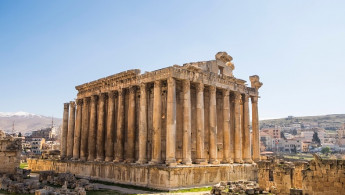UN to consider 'enhanced protection' as Lebanon warns heritage at risk
The UN cultural agency UNESCO said Thursday it would consider enhanced protection of ancient sites in Lebanon after a wave of near-misses in strikes by Israel triggered an appeal by Lebanese lawmakers.
Several Israeli strikes in recent weeks on the eastern city of Baalbek and the southern city of Tyre -- both strongholds of Iran-backed group Hezbollah -- have hit close to ancient Roman ruins designated by UNESCO as World Heritage sites.
A UNESCO committee will meet in extraordinary session in Paris on November 18 to consider the inscription of Lebanese heritage sites on UNESCO's list of sites under "enhanced protection", the agency said.
Enhanced protection status gives heritage sites "high-level immunity from military attacks", UNESCO said, warning that "criminal prosecutions and sanctions, conducted by the competent authorities, may apply in cases where individuals do not respect the enhanced protection granted to a cultural property".
The announcement came after more than 100 Lebanese lawmakers appealed to UNESCO to ensure the preservation of heritage sites in areas heavily bombed by Israel during its war on the country.
"During the devastating war on Lebanon, Israel has caused grave human rights violations and atrocities," the lawmakers said in their appeal to UNESCO chief Audrey Azoulay.
"As parliamentarians, we bring to your attention an urgent need: the protection of Lebanon's historic sites in Baalbek, Tyre, Sidon, and other invaluable landmarks currently at risk due to the escalation of the atrocities," it said.
"These cherished landmarks, treasured not only by our nation but by the world, face imminent risk as the war escalates."
Lebanon is home to six UNESCO World Heritage sites, including Roman ruins in Baalbek and Tyre.
In Baalbek, Israeli strikes on Wednesday destroyed a heritage house dating back to the French mandate and damaged the historic Palmyra Hotel near the city's Roman temples, according to local authorities.
During its 150-year history, the Palmyra Hotel has welcomed guests including post-war French president Charles de Gaulle and US singer and civil rights activist Nina Simone.
The strikes hit just a few metres (yards) from the ruins, the closest since the start of the war, officials said.
"We are waiting for specialists from UNESCO and the Directorate General of Antiquities" to determine if there was any damage, Baalbek mayor Mustafa al-Shall told news agency AFP.
Hezbollah and Israel have been at war since late September, when Israel broadened its focus from fighting in the Gaza Strip to securing its northern border, even as the Gaza war continues.
Since September 23, more than 2,600 people have been killed in Israeli strikes on Lebanon, according to Health Minister Firass Abiad.
Israel says it is targeting Hezbollah positions and infrastructure, including in Tyre and Baalbek.
"To date, the first remote analyses have not yet identified visible damage to the World Heritage sites of Baalbek and Tyre," UNESCO said.
"However, these preliminary assessments will have to be complemented by more precise field inspections when the situation permits".
UNESCO said it was providing expertise and technical support to Lebanon's antiquities department to help transport and store artefacts from Tyre, Sidon and Baalbek.
The Lebanese MPs called on Azoulay to "urgently prioritise the protection of these historic sites by mobilising UNESCO's authority, securing international attention and advocating for protective measures".
"This appeal goes beyond physical preservation; it is about safeguarding the traditions, stories and values these sites represent -- legacies that connect our past to our future."
Prime Minister Najib Mikati called on Monday for a ceasefire "to protect our country's cultural heritage, including the ancient archaeological sites of Baalbek and Tyre".
He called on the UN Security Council to "take swift and decisive action to protect these historical treasures".




 Follow the Middle East's top stories in English at The New Arab on Google News
Follow the Middle East's top stories in English at The New Arab on Google News
![A group of Palestinians, foreign and Israeli activists gather to participated in an olive picking event on the land in the town of Battir, which is under threat of confiscation by Israel in Bethlehem, occupied West Bank on 8 November 2024. [Getty]](/sites/default/files/styles/image_330x185/public/2182930803.jpeg?h=199d8c1f&itok=__0LgGsa)

![People gathered around the rubble of destroyed houses to search for survivors [Getty]](/sites/default/files/styles/image_330x185/public/2024-11/GettyImages-2184733820.jpg?h=199d8c1f&itok=NiM1LO2f)